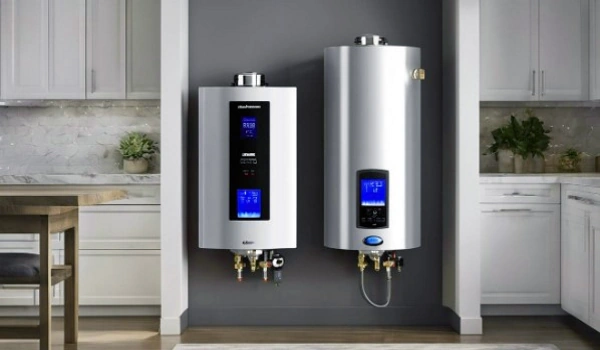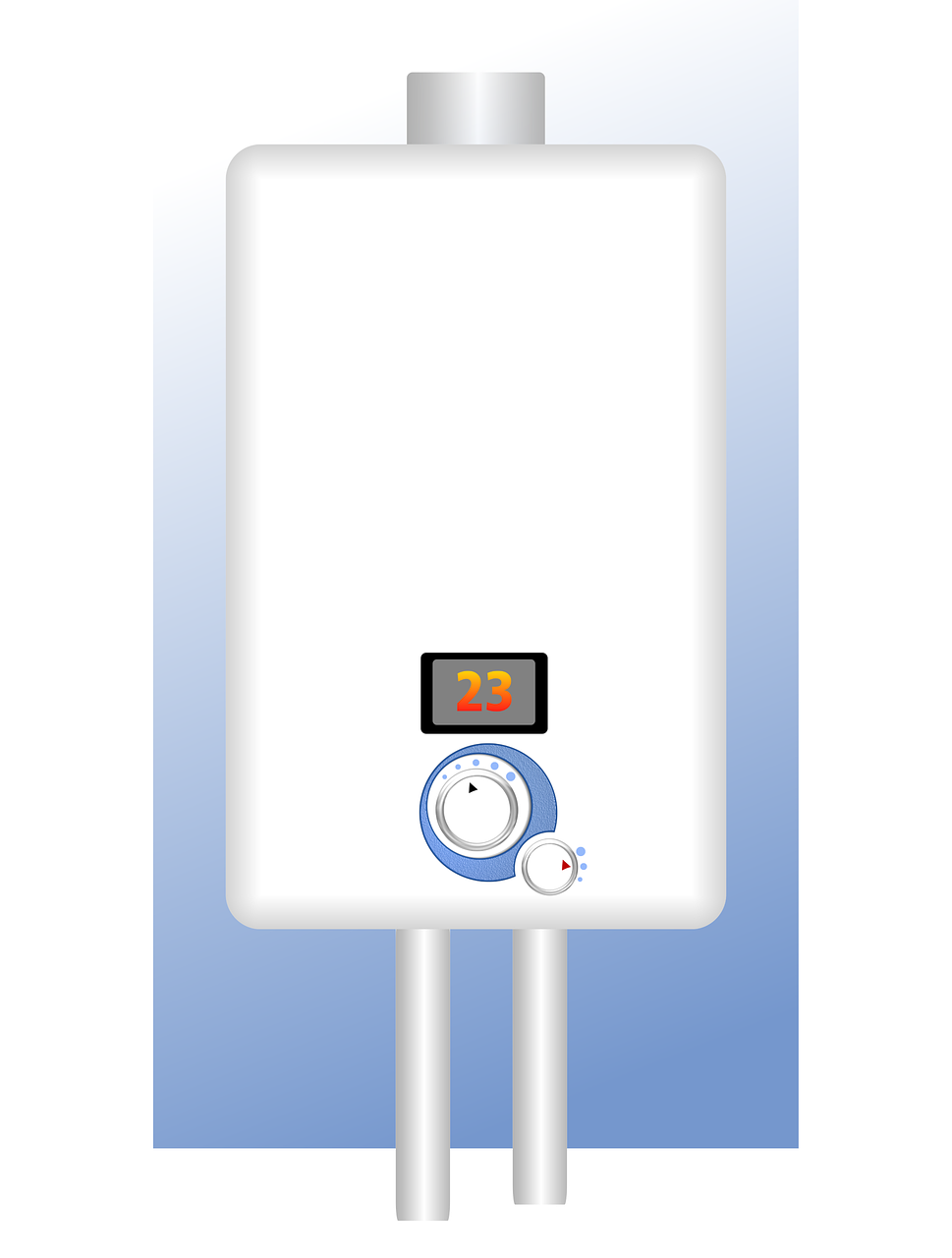
Electric vs. Gas Tankless Water Heaters: Benefits, Installation, and Efficiency Compared
In the battle of gas vs. electric tankless water heaters, both have unique advantages. Gas units tend to heat water more quickly, yet electric models are highly energy efficient. However, it’s not all about speed or saving energy; there are hidden layers like installation requirements and costs. Knowing this makes it easier to identify which suits your home better. Your heated water journey begins when you understand these differences.
Electric vs. Gas Tankless Water Heater: The Difference in Tankless Water Heaters
When it comes to choosing between a gas and electric tankless water heater, numerous factors come into play. It’s not just about energy usage or installation; it’s also about how well it fits your lifestyle, needs, and home. One of the primary considerations should be the overall financial impact it will have.
Gas tankless water heaters are generally more efficient than electric ones, especially for households with high hot water demand, as they convert energy to heat more efficiently. However, their installation is more complex due to the need for gas supply lines and venting for exhaust. On the flip side, electric tankless water heaters are suitable for homes with limited space and lower hot water demand. While they are less expensive than gas heaters, their efficiency may struggle to keep up with multiple major appliances at the same time.
For homeowners in Utah County and beyond, considering factors such as energy costs, hot water demand, installation expenses, venting requirements, and maintenance needs is crucial before deciding on the type of tankless water heater to install.
For instance, a household with substantial power and hot water demands might find that a gas tankless water heater operates most cost-effectively. In contrast, an electric heater may be more cost-effective for a residence with lower water demands and energy costs.
When it comes to real viability, consulting with a professional like JBK Plumbers is strongly recommended to evaluate options thoroughly. This ensures compliance with building codes and safety when making an informed choice.
Energy Usage: Comparing Efficiency
When it comes to the efficient use of energy, gas tankless water heaters hold a distinct advantage over their electric counterparts due to their higher energy factor, which denotes how efficiently they convert fuel into heat.
Gas Tankless Water Heaters
Gas tankless water heaters boast higher energy efficiency compared to electric models. They are designed to heat water more rapidly and are capable of meeting high hot water demands effectively. As a result, they are ideal for larger households or commercial settings where the need for hot water is substantial and frequent.
The higher energy factor means that gas tankless water heaters can produce more hot water using less fuel, effectively lowering operating costs and reducing energy consumption. This makes them a preferred choice for individuals or businesses looking to reduce their carbon footprint and energy bills simultaneously.
Electric Tankless Water Heaters
On the other hand, electric tankless water heaters are more suitable for smaller households or areas with lower hot water demand. They prioritize efficiency at lower scales, making them ideal for homes with moderate hot water needs and limited space for installation. While they may not match the high output of gas models, electric tankless water heaters are an excellent choice for those seeking energy-efficient solutions for their specific requirements.
It’s important to consider the context in which each type of tankless water heater will be used, as this plays a crucial role in determining which system will provide the most efficient and cost-effective hot water solution for your needs.
Understanding the efficiency differences between gas and electric tankless water heaters is essential when deciding on which type to choose for your home or business. By evaluating your hot water needs and considering your long-term energy goals, you can make an informed choice that aligns with your requirements while optimizing energy usage and costs.
Financial Impact: Costs and Savings
When choosing between gas and electric tankless water heaters, it’s essential to consider not just the immediate costs but also the long-term financial implications. Let’s take a closer look at how these factors stack up against each other.
Initial Costs
Gas tankless water heaters often come with higher upfront costs due to their complexity. These units typically require professional installation and may necessitate modifications to accommodate venting and gas lines.
On the other hand, electric tankless water heaters are generally more affordable to purchase and install. This difference in initial costs is an important consideration for homeowners looking to make a prudent investment in a sustainable water heating system.
Additionally, it’s crucial to factor in installation expenses when making your decision. Gas tankless water heater installations usually involve additional components such as ventilation systems and gas line modifications, adding to the overall cost. Meanwhile, electric tankless water heaters are often simpler and less costly to install.
Operating Costs and Savings
Beyond the initial investment, the ongoing operating costs and potential savings should be carefully evaluated. Gas tankless water heaters typically boast lower operating costs over time due to the comparably lower price of natural gas in many regions. This can lead to significant long-term savings on energy bills, making them a financially prudent choice for many homeowners.
Conversely, while electric tankless water heaters may offer a more economical upfront cost, they can result in higher energy bills, especially in areas with expensive electricity rates. The increased electrical usage required by these units may offset any savings gained from their lower initial expense. This is a critical factor for consumers looking to make a financially sound decision regarding their water heating system.
When deciding between gas and electric tankless water heaters, it’s clear that both initial costs and long-term savings play substantial roles in the financial impact of each option. Homeowners should carefully weigh these factors against their budgetary constraints and long-term energy consumption goals before making a decision that aligns with their needs and preferences.
Installation and Maintenance: What to Expect
When deciding between gas and electric tankless water heaters, it’s essential to consider not only the initial installation but also the regular maintenance that each type requires.
Gas Tankless Water Heater Installation: Installing a gas tankless water heater is more complex compared to an electric unit. It typically requires professional installation due to the involvement of gas line connections and venting, resulting in additional installation costs. Venting needs are especially important for gas units, as they produce exhaust gases that must be safely removed from your home. This process calls for careful consideration to ensure a safe and proper installation.
Electric Tankless Water Heater Installation: On the other hand, electric tankless water heaters are generally easier and less costly to install, especially if your home already has sufficient electrical capacity. They don’t require venting like gas units, which can significantly simplify the installation process. If you’re considering switching to an electric unit from a traditional water heater, you’ll want to make sure your electrical system is up to the task, as upgrading might be necessary.
Keep in mind that opting for professional installation for either type of tankless water heater can help ensure that everything is set up properly, minimizing the risk of future issues.
Now, let’s talk about water heater maintenance. Gas tankless water heaters tend to have more frequent maintenance requirements due to the combustion process involved in heating water. This includes regular servicing of the burner and the venting system to ensure safe operation. Additionally, periodic checks for soot buildup and ensuring proper ventilation are essential for continued safety and efficiency.
Electric tankless water heaters, by contrast, generally have lower maintenance needs. However, some level of care is still necessary. Periodic checks for scale buildup within the unit and inspections of electrical components are important to prevent unexpected breakdowns and maintain optimal performance.
Both types of tankless water heaters benefit from annual or biannual professional inspections to ensure that all components are functioning properly and efficiently. These inspections can identify issues early on, saving you money on potential repairs down the road.
It’s worth noting that keeping maintenance records for your tankless water heater can help you track its performance over time and provide valuable insights into any recurring issues that may need attention.
Understanding the differences in installation complexity and maintenance requirements between gas and electric tankless water heaters can help you make an informed decision when choosing the right option for your home.
What Size is Right For You? Optimal Heater Sizes
Choosing the right size tankless water heater is crucial to meeting your household’s specific hot water needs. One of the first things to consider is the type of fuel source—gas or electric—that best suits your requirements.
Gas tankless water heaters are known for their higher flow rates and ability to provide hot water to multiple fixtures simultaneously, making them a suitable choice for larger homes with greater hot water demands. Imagine having a big family where everyone wants to shower within the same timeframe—it’s crucial to have a water heater that can keep up with this demand without compromising on water temperature.
In contrast, electric tankless water heaters are more suited for smaller homes or apartments with lower hot water demands, providing hot water for one to two fixtures at a time, making them ideal for households with minimal simultaneous hot water needs.
To determine the optimal heater size, it’s essential to assess your household’s hot water usage patterns—consider the number of hot water fixtures and how often they are used simultaneously. For instance, if the dishwasher runs while someone is taking a shower frequently, an electric tankless water heater may struggle to meet these simultaneous demands.
For example, in a spacious home with four bedrooms and two bathrooms, a gas tankless water heater would be more suitable as it can supply multiple points of use throughout the house without compromising on performance. On the flip side, in a modest apartment with one bathroom and a compact kitchen, an electric tankless water heater would likely suffice for your hot water needs.
By carefully evaluating your household’s hot water requirements and considering the specific benefits of gas and electric tankless water heaters, you can make an informed decision on the right size and type of heater that best aligns with your needs for a consistent and comfortable hot water supply.
Considering the numerous crucial factors involved in choosing the right water heating system for your home, it’s essential to weigh the pros and cons meticulously. Need assistance in making this crucial decision? Contact JBK Plumbers at 801-874-7976 for expert guidance tailored to your unique requirements.

